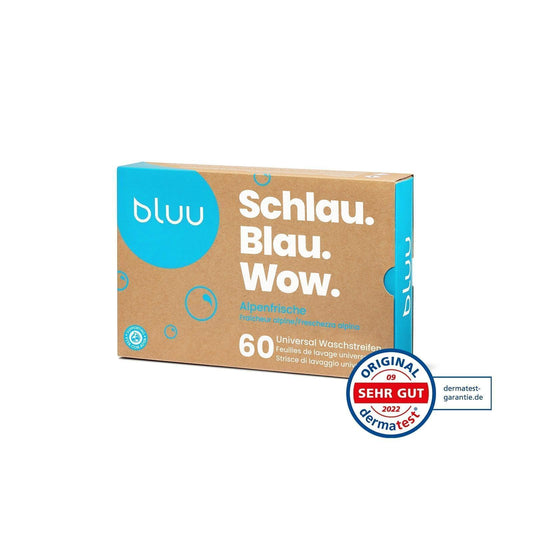The skin on your arms and legs itches and is unusually reddened - even though the laundry came straight out of the machine? Then you may be sensitive or even allergic to your detergent or fabric softener! This is mostly due to skin-irritating and allergenic ingredients that are deposited in your clothes when you wash them. In this post, you will learn how to easily get rid of this annoying problem!
Allergic reaction to laundry detergent? These are the most common causes!
This is how skin irritation occurs
- Neurodermatitis or allergy
- harmful fragrances in the detergent
- Residues of surfactants or bleach are deposited

Many detergents and fabric softeners are fortified with lots of ingredients to keep laundry soft and smelling fresh. However, in addition to synthetic fragrances, you are also bringing harmful surfactants and bleaching agents into your home, which can cause irritation or even allergic reactions if they come into contact with the skin.
A detergent allergy is caused by deposits of these substances in clothing, which in turn comes into contact with your skin.
With frequent contact, many an immune system reacts incorrectly to the substances, which are usually harmless to the body. These reactions particularly often affect people who suffer from allergies or neurodermatitis. Here the body reacts particularly sensitively to synthetic substances.
If you belong to this group of people, you should first pay attention to the materials your clothing is made of. Because as with detergents, the following applies here: the more artificial, the more harmful! If you instead opt for natural materials such as cotton, silk or linen and wash them with an environmentally and health-friendly detergent, the unpleasant symptoms will soon be a thing of the past!
How do I recognize a detergent allergy?
The symptoms
- itching
- red and dry skin
- swelling in arms and legs
- rash and pustules
Many people are allergic to the artificial ingredients in detergents and fabric softeners. The result is itching, swelling, redness and even pustules on the skin that occur during or after wearing freshly washed laundry. Ultimately, only a doctor can determine whether this is actually an allergic reaction to your detergent. So if you regularly observe such symptoms, then you should consult a doctor. An allergy test can be used to determine which substance you are allergic to. By changing your detergent and using an ecological variant, you can also determine the problem yourself. If you notice that this reduces the redness, you should only use skin-friendly and environmentally friendly detergents without harmful substances in the future.
Allergy to detergent - what now?
If you are sensitive to detergent and fabric softener, you should definitely remedy the problem immediately. If you experience unpleasant itching and redness, you can take a quick shower to remove the harmful substances from your body. Then grab airy, comfortable clothing that you have washed with an ecological and skin-friendly detergent. In order to free yourself from such problems in the long term, you should permanently avoid the harmful substances and stay away from conventional detergents.
Finally wash skin-friendly: with these 5 washing tricks!
1. Choose a detergent without allergens
You can prevent allergic reactions by checking the detergent label. In the future, therefore, use a detergent that does not contain any harmful substances . Orient yourself to seals such as that of Dermatest. The Dermatest seal is an award for independently tested products that come into contact with the skin. Products that have been awarded this seal after testing are skin-friendly and safe. This also includes our washing strips - only the best for your laundry and skin.

- Surfactants: are harmful and yet contained in conventional detergents
- Enzymes: for removing stains are not kind to the skin
- Bleaching agents: make white laundry whiter, but damage the skin
- Fragrances: irritate the skin and are mainly added to fabric softeners
- Silicones: defoam water and settle on clothing
2. Choose the right detergent for sensitive skin
Fortunately, there are now great detergent alternatives that do not harm the environment or your skin! Unlike conventional products, these detergents do not contain any artificial surfactants or fragrances and are therefore not only biodegradable, but also kind to the skin and thus avoid allergic reactions! This also distinguishes the super effective washing strips from bluu from other products. They are particularly well tolerated and also suitable for washing baby clothes or clothes for people with allergies . Even at a low washing temperature, your clothes will be clean and no harmful ingredients will be deposited in the textiles. Sounds great, right? It is!

3. Reduce detergent and fabric softener
Most people use way too much detergent and fabric softener in one wash. This often leaves residues in the drum and in the fabric softener compartment, which in turn are deposited on the clothing. From there, the ingredients then get onto the skin - and unsightly redness and pustules develop. So if you use a conventional detergent or fabric softener, you should follow the manufacturer's dosage recommendations and under no circumstances overdose. Simply use the enclosed dosing aids or switch to better-tolerated detergents - your skin will thank you!
4. Add an extra rinse cycle after washing
If you notice that your skin is allergic to detergent, you can also add an extra rinse cycle after washing. The washing residues are thoroughly removed from the machine and also from your clothes. The water dissolves the artificial ingredients and effectively rinses the clothes. However, since this is not a particularly environmentally friendly solution due to the high water consumption, you should only use the extra rinse cycle in an emergency. It is much better to wash immediately with compatible agents!
5. Clean the washing machine regularly
If you want to pay more attention to your skin health to avoid allergic reactions to detergents in the future, you should also pay attention to the hygiene in your washing machine. There are often countless residues, bacteria and germs that have accumulated through the numerous previous washes. These are also deposited on the laundry during washing and can thus lead to skin irritation. Therefore, clean your washing machine every few weeks with a special cleaner or with a solution of lemon juice and a wash cycle at around 60 °C . This removes unwanted dirt from the machine and your clothes are completely clean again when you wash them!

Would you like to give your washing routine an update and wash in an environmentally and skin-friendly way in the future? Then take a look at our allergen-free detergent.




